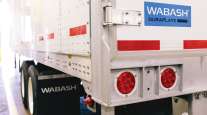Senior Reporter
Wabash Reports Q1 Net Loss, Revenue Drop

[Stay on top of transportation news: Get TTNews in your inbox.]
Wabash National Corp. reported a first-quarter net loss and lower revenue as the novel coronavirus heavily disrupted freight demand in March and customers delayed pickup of finished trailers.
The results also included a large goodwill impairment charge.
For the period ended March 31, Wabash posted a net loss of $106.6 million, or a loss of $2.01 per diluted share. That compared with net income of $14.7 million, or 27 cents, a year earlier.
Revenue fell to $387.7 million compared with $533.1 million as customer pickups of equipment trailed expectations.
Lafayette, Ind.-based Wabash manufactures semi-trailers, truck bodies and liquid transportation systems.
Its gross margin slipped to 9.5% compared with 12.9% a year earlier.

Yeagy
“The world has changed at a tremendous pace since last quarter,” CEO Brent Yeagy said during the earnings call, noting the first two months of the quarter went as expected, but March initiated “unprecedented times.” But its supply base weathered the storm well, “and at this time we do not see significant liquidity or solvency risk” within the group as a result of shutdowns or reduced market demand.
Wabash has enjoyed a “No. 1 or No. 2 position in the vast majority of our markets, and we intend to leverage this crisis to further distance ourselves from our competition,” Yeagy said. “This crisis has afforded us the opportunity to move faster with organizational changes that were already underway, which we believe will allow us to increase our level of intimacy with our customers and drive, at an accelerated pace of innovation, to further differentiate our products in the marketplace.”
He said details of that would be explained on future calls.
For Wabash’s largest unit, commercial trailer products, March tends to be the most significant month in the quarter in terms of revenue, income and trailer pickups, he said.
Revenue at its commercial trailer products unit dropped to $251 million, a decrease of $90.1 million, or 26.4% compared with the prior-year quarter, as market demand normalized.

Host Seth Clevenger speaks with Mike Perkins and Derrick Loo, test drivers at Peloton Technology, one of the companies at the forefront of developing truck platooning systems. Hear a snippet, above, and get the full program by going to RoadSigns.TTNews.com.
New trailers shipped at the unit fell to 8,525 compared with 12,400.
Revenue at the diversified products unit fell to $83 million, a decrease of $16.7 million, or 16.7% compared with a year earlier. Wabash noted that while the tank trailer business showed relative stability, revenue was more than offset by lower volumes in the composites business.
The number of new trailers shipped in the diversified unit slipped to 625 compared with 700.
Its final mile products unit saw revenue slide to $60 million, a decrease of $40.6 million, or 40.2% compared with the 2019 period. Wabash again cited slower customer pickups and softer demand compounded by COVID-19. At the same time, the unit’s performance reflected a noncash goodwill impairment charge of $95.8 million related to the 2017 acquisition of Supreme Industries Inc.
“The major change in our modeling of the final mile business was the near-term cash flows,” Chief Financial Officer Michael Pettit said. “Given the environment we are in, we believe we will have significantly lower cash contributions from final mile in 2020 and 2021,” compared with what it modeled in the fourth quarter. “That said, nothing really changed about our long-term outlook in that business. We believe that business returns to the same level of long-term growth, cash generation and profitable growth that we had modeled in the time of acquisition, and earlier points when we were modeling the goodwill.”
All major producers of truck chassis “have implemented hard and relatively extended shutdowns in response to the COVID-19 crisis. While we may expect chassis production to open in the near future, the full impact on the supply chain is still being worked through,” Yeagy added.
Wabash reported its backlog stands at about $1 billion compared with $1.1 billion in December.
Liquidity at the end of the quarter was $277 million — with cash of $155 million and available borrowings of $122 million. The company’s nearest debt maturity, amounting to $135 million, is in March 2022.
Want more news? Listen to today's daily briefing:


